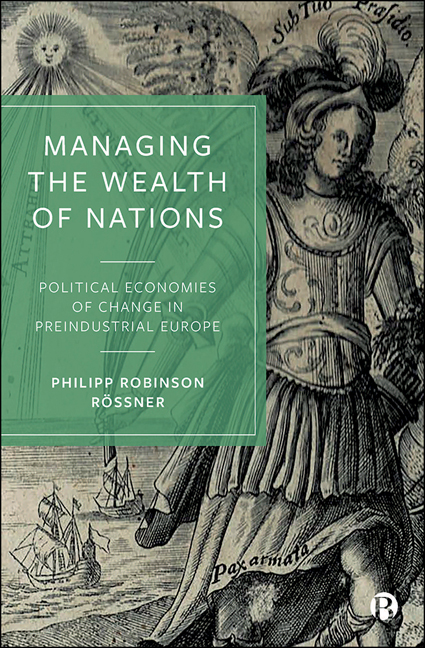Book contents
- Frontmatter
- Contents
- List of Figures and Tables
- Acknowledgements
- 1 Inventing Dynamics: Political Economies of Money, Markets and Manufacturing, 1300s–1800s
- 2 Governing the Future: Capitalism’s Early Modern Temporalities and the Origins of Growth
- 3 The Myth of the Myopic State: Governing Economy and the Politics of Economic Change, 1250s–1850s
- 4 Configuring Free Markets: A Deeper History of Laissez-Faire
- 5 Money and the Rise of Modern Capitalism
- 6 Velocity! Money, Circulation and Economic Development, c.1250–1850
- 7 Creating Wealth: Homo Manufacturabilis and the Wealth of Nations
- 8 Manufacturing Wealth: Industrial Policy and the Rise of the European Economy, 1350–1850s
- Epilogue: State Capacity and Capitalism from Cain to Keynes: Money, Markets and Manufacturing
- Notes
- Index
5 - Money and the Rise of Modern Capitalism
Published online by Cambridge University Press: 17 January 2024
- Frontmatter
- Contents
- List of Figures and Tables
- Acknowledgements
- 1 Inventing Dynamics: Political Economies of Money, Markets and Manufacturing, 1300s–1800s
- 2 Governing the Future: Capitalism’s Early Modern Temporalities and the Origins of Growth
- 3 The Myth of the Myopic State: Governing Economy and the Politics of Economic Change, 1250s–1850s
- 4 Configuring Free Markets: A Deeper History of Laissez-Faire
- 5 Money and the Rise of Modern Capitalism
- 6 Velocity! Money, Circulation and Economic Development, c.1250–1850
- 7 Creating Wealth: Homo Manufacturabilis and the Wealth of Nations
- 8 Manufacturing Wealth: Industrial Policy and the Rise of the European Economy, 1350–1850s
- Epilogue: State Capacity and Capitalism from Cain to Keynes: Money, Markets and Manufacturing
- Notes
- Index
Summary
As for the right of coinage, it is contained within the law-making power, for only he who can make law can regulate currency. This is illustrated in the very terms used by Greeks, Romans, and French alike, for the word nummus comes from the Greek nomos signifying both law and alloy. There is nothing of more moment to a country, after the law, than the denomination, the value, and the weight of the coinage, as we have already shown in a separate treatise. Jean Bodin, On the true attributes of sovereignty
Early modern money's dirty hidden lives
Money lies at the heart of the economic process. It is dirty. When Saxon polymath, medic and engineer Georg Agricola published in 1556 his muchacclaimed mining handbook De re metallica – the first full translation from the original Latin into modern English made by no less than Herbert Hoover, later president of the United States – he was crystal clear about money's dangerous origins in mining:
The critics say further that mining is a perilous occupation to pursue, because the miners are sometimes killed by the pestilential air which they breathe; sometimes their lungs rot away; sometimes the men perish by being crushed in masses of rock; sometimes, falling from the ladders into the shafts, they break their arms, legs, or necks; and it is added there is no compensation which should be thought great enough to equalize the extreme dangers to safety and life.
Silver mining was at the heart of the transitions (and subsequent decline) of capitalism that swept central Europe during the age of the early Reformation. Martin Luther, who wrote his main economic pieces on business and usury, was not an ignoramus helplessly shouting against the rise of modern capitalism, but rather its decline; his works addressed late capitalism's perversions in the wake of the penultimate medieval mining boom that had transformed the economic morphology and turned the Saxon-Thuringian lands into engines of growth, with increasing inequality, peasant unrest and skyrocketing business profits made by some late medieval super-companies including Fugger and Welser that ran some of the largest mining and smelting works and practically controlled the Asian spice trades and global silver flows. Environmental pollution and degradation were intrinsic byproducts of this boom – and thus the process of ‘making’ money.
- Type
- Chapter
- Information
- Managing the Wealth of NationsPolitical Economies of Change in Preindustrial Europe, pp. 100 - 126Publisher: Bristol University PressPrint publication year: 2023



